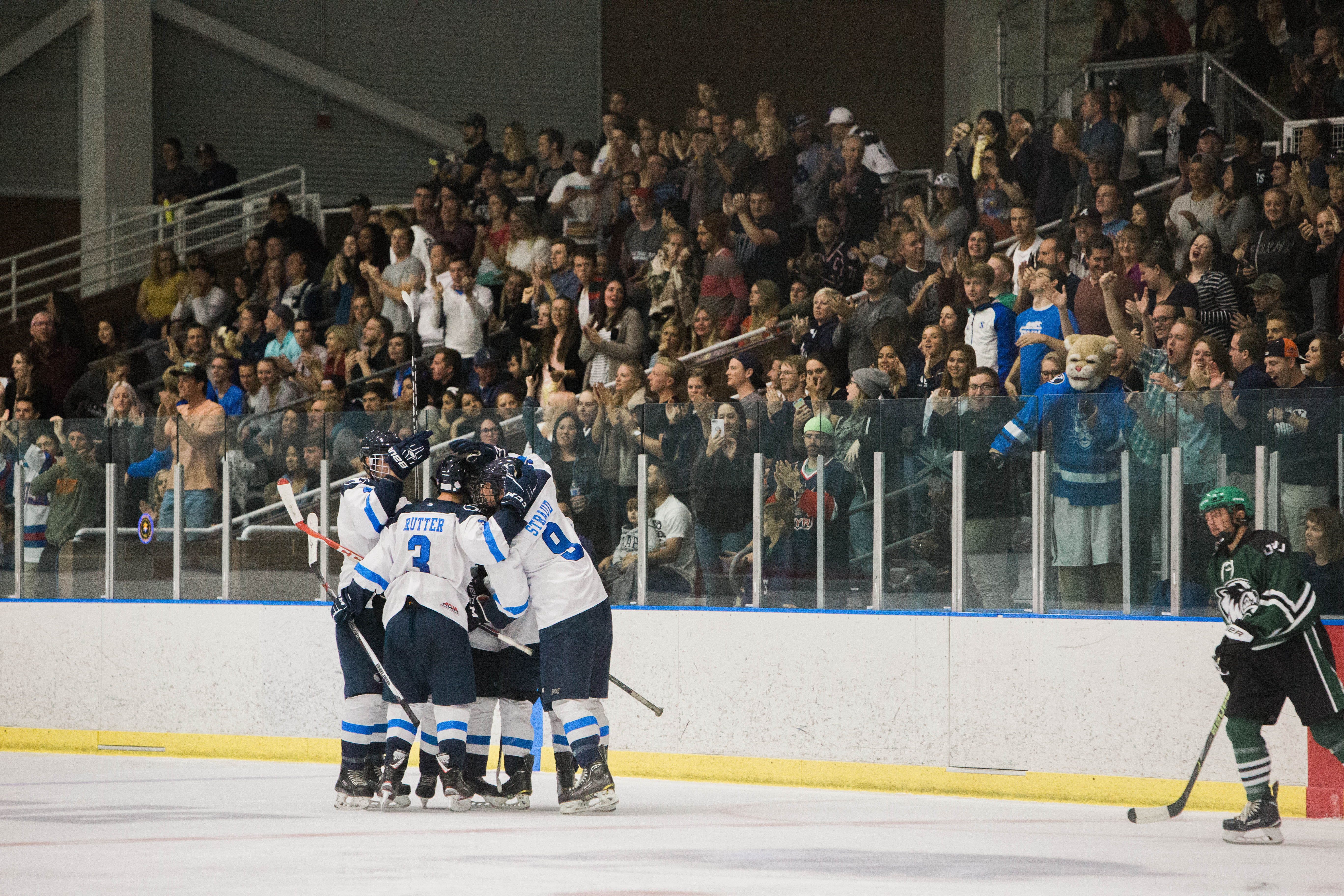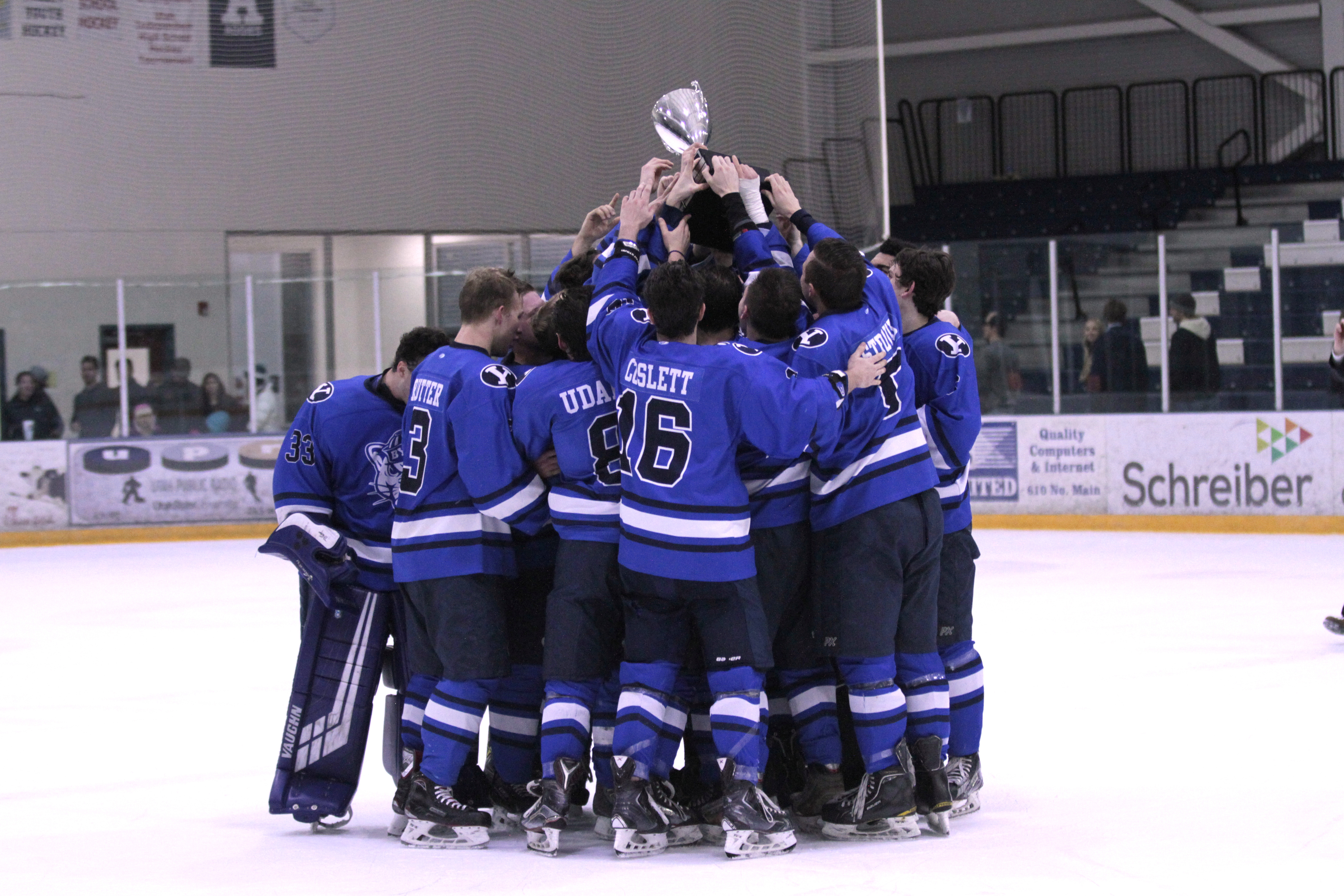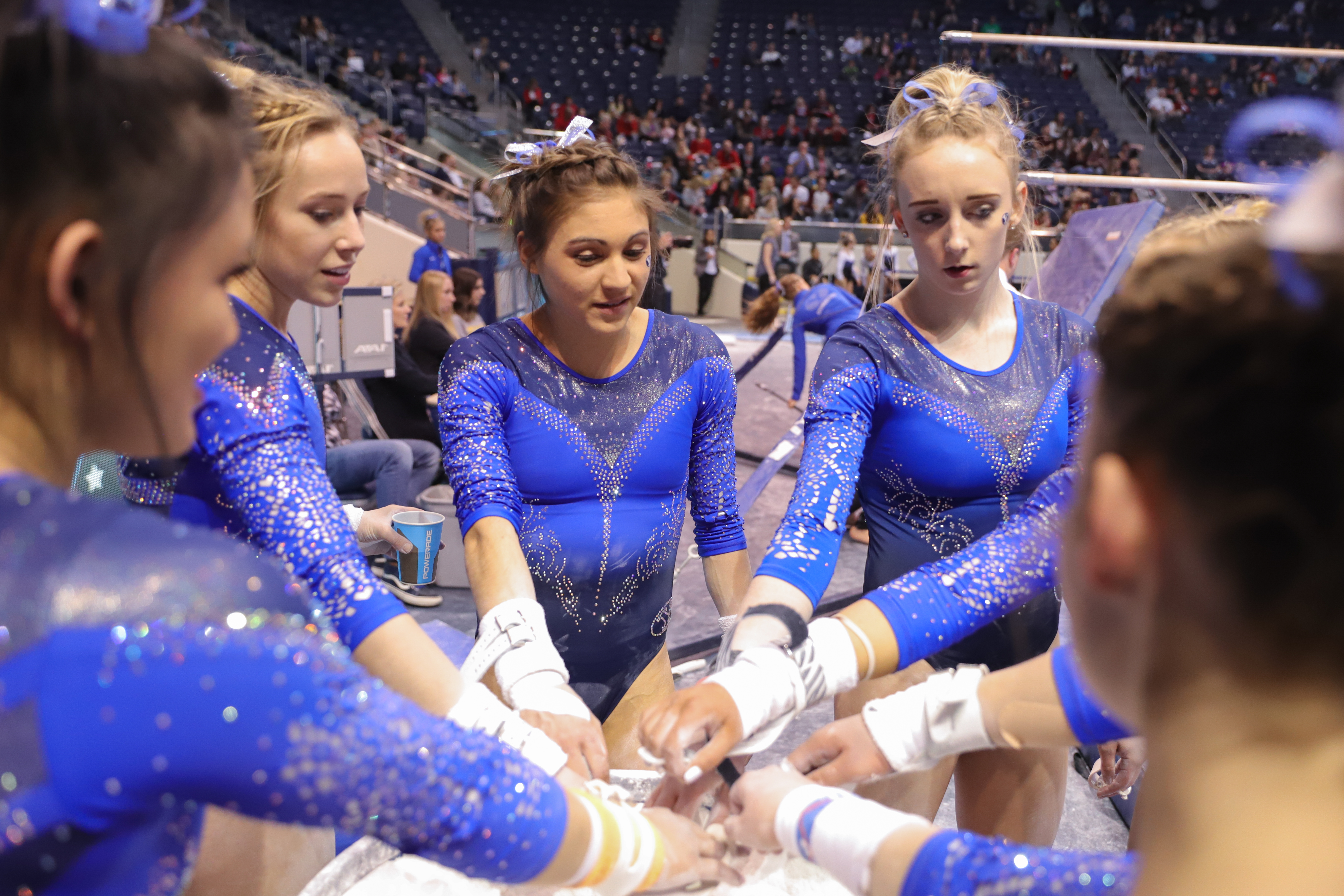
BYU sponsors 21 Division I varsity teams, with 11 teams participating in the West Coast Conference. Aside from the Cougars’ 296 conference champion wins, BYU boasts additional honors through the school’s club and extramural sports.
Obvious differences between NCAA-sanctioned sports and non-NCAA teams create difficulties for coaches and players alike.
BYU’s club hockey team found a place in the spotlight for a season after years of trying to find its footing. In 2016, the team racked up a disappointing 7-21 record. Several seasons later, with new players and a new head coach, the Cougars ended the season with a 19-9 record.
BYU hockey head coach Dave Pitcher said he recognizes steady growth in the program as they earned their spot in the Western Division Regional Playoffs this past March. With the season now done, he says he is putting his efforts into recruiting. Hockey at BYU lacks NCAA status and therefore remains a club sport, which Pitcher says is an “uphill battle” as they face other advantaged hockey programs with NCAA status.
“They have coaches who are getting paid hundreds of thousands of dollars and they can give scholarships to players and can get exemptions in admissions,” Pitcher said. “So it’s even harder for a club team.”

Athletes on club and extramural teams are required to pay specific fees for each season. However, scholarships are not awarded to athletes like they are for many NCAA athletes. Players on the hockey team pay $2,000 each season. Pitcher said he has sympathy for his athletes who struggle to pay these high fees.
“We have players that are married, and one of our players has two children, so they are busy boys,” Pitcher said. “When they commit to this team, they are committing to very heavy academic challenge, along with work for a lot of them.”
Not only does this make the recruitment process difficult, but players tend to come and go more often than in NCAA-sanctioned sports. Senior Ashton Shimbashi played on BYU’s club hockey team for four years and said he watched this happen.
“It makes it difficult to keep players sometimes,” Shimbashi said. “It can be hard to sacrifice $2,000 if you’re a freshman and don’t get a ton of playing time.”
Shimbashi attempted to play hockey as a working, full-time student but he found the schedule difficult to manage.
“I had a job in the past, and it’s quite frankly unreasonable,” Shimbashi said. “As a captain on the team, I tell the new players to not take too many credits or get a job because hockey is time-consuming.”
A benefit to playing club and extramural sports is not needing to abide by strict NCAA guidelines.
“There’s a little bit less red tape,” Shimbashi said. “We have a little bit more freedom and flexibility when it comes to scheduling and the way we travel.”
Shimbashi also believes there is a negative stigma attached to being a part of a club team.
“People think clubs are just for fun and to build friendships,” Shimbashi said. “That’s definitely part of it, but it doesn’t take away from the competitive nature of what we’re trying to accomplish.”
Shimbashi hopes the school will become more involved in major club sports, especially in their times of success.
“A lot of times, you just don’t really feel the support,” Shimbashi said. “I think receiving more support, whether that be financial or help with recruitment, would be helpful.”
Athletes who already plan on attending BYU tend to look into extramural programs rather than seeking out the university with their eye on athletics. In addition to Pitcher, assistant racquetball coach Joe Blank realizes the difficulty of recruiting.
“There is nothing that we have to offer right off the bat to incentivize someone to pick us over another school, except for the fact that BYU is incredible academically,” Blank said. “For the most part, 100% of our players are pulled directly from the student body.”
Extramural sports and club sports differ in that club sports are organized by members of the student body whereas extramural sports are usually formed by a university committee.
“You’re not going to see coaches offer people scholarships in their homes,” extramural program director Morris Havea said. “What you will see is our coaches saying to any LDS kid ever, ‘We want you, so just try to get into BYU on your merits, and then we’ll talk.’”
Extramural teams at BYU currently consist of men’s and women’s rugby, lacrosse, racquetball and men’s soccer. Extramural athletes are required to pay a $200 fee, much smaller than fees paid in club hockey, each semester that covers travel expenses, gear and training.
Havea said he recognizes extramural and club athletes could feel second to those competing in an NCAA sport.
“They’re the low-key type of kids, and you never hear anything crazy about them,” Havea said. “They’re awesome; they go out there and clean house.”
Playing in the NCAA comes with many benefits, but also strict rules and guidelines that must be followed by coaches and athletes.
Students must maintain a certain grade point average and be full-time students. They are also limited in employment opportunities.
Like NCAA sports, extramural and club sports also maintain a high GPA, though they are not restricted by the NCAA to do so. Those participating in these sports have more flexibility than NCAA athletes when it comes to missing a practice or game if they need extra study time or something else comes up in their lives. Though they do not have the same restrictions that the NCAA has, club and extramural sports still require a high level of self-discipline when balancing their personal lives and the sports they play.
BYU women’s gymnastics head coach Guard Young says he thinks club and extramural sports benefit from avoiding these restrictions.
“When you’re participating in club sports, you don’t have to be a full-time student,” Young said. “There are some benefits in that you don’t have to be a full-time student and still do the sport that you love.”
NCAA sports receive funding, training facilities and scholarships, but Young said not all athletes are paid for. He said many members of the women’s gymnastics team opt out of employment in order to devote time to gymnastics.

“I get just 12 scholarships for 24 athletes,” Young said. “Half of my team are normal students who are figuring out how to pay for school, and yet they’re giving me 20 hours a week for their training.”
Young also encouraged students to seek out a club or extramural sport if you are a high-level athlete participating in a sport that is not offered through the NCAA at BYU.
Coach Brandon Gilliam, the extramural men’s soccer coach, explained the level of talent his team has in addition to the level of competition they play.
“Every year during the spring, we put together a NCAA spring season. We play Division I, Division II and junior colleges,” coach Gilliam said. “We went down and played UNLV this spring, who went to the NCAA tournament last fall, and for the most part, we outplayed them. We can compete with Division I programs with the talent we have now.”
When asked what he would say if someone asked him about extramural sports and the stigma surrounding their level of talent in comparison to NCAA-affiliated sports, coach Gilliam said that everyone who is capable of representing BYU deserves the same respect.
“If I’m in the athletic department, if I’m on ballroom dance, if I’m singing for the school, if I’m playing for an extramural sport, if somebody is capable of being here at this university and representing the university outside the campus, they need the same respect,” coach Gilliam said. “They’re all doing the same job.”




